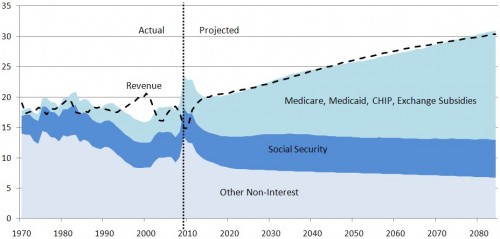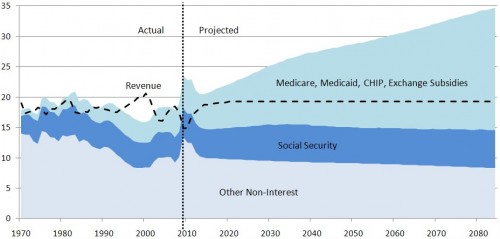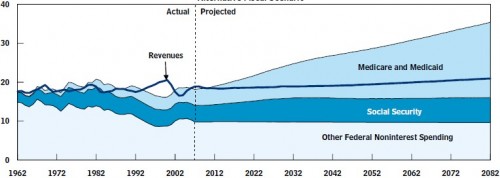Each time CBO came up with a budget projection for health reform, swords came out. On one side were those who said CBO was being too optimistic. Those Medicare cuts won’t happen or more people will opt out (or be dumped from) employer coverage, they claimed. On the other side, CBO defenders suggested CBO was being reasonable, even conservative. And besides, they would add, somebody has to be the official arbiter of the budgetary effects of bills. Neither side is right, but they share one thing in common: a focus on the wrong problem.
In a Kaiser Health News column today, Rea Hederman and Paul Winfree continue this debate, highlighting a new Heritage Foundation interactive health reform budgeting tool with which users can second guess CBO estimates and see the impact on future premiums, taxes, deficits, coverage rates, and “government dependency.”
Our findings demonstrate just how sensitive the CBO’s scorecard can be when slight differences are applied to the agency’s underlying assumptions. For instance, if only 40 percent of the scheduled Medicare cuts actually occur, the law will push up the federal deficit by more than $132 billion in the first 10 years.
In addition, if 14 million Americans (rather than the 8 million predicted by the CBO) end up leaving their employer-sponsored health plans, the federal deficit would jump by more than $300 billion. This could happen because more are enrolled in Medicaid or qualify for subsidies to purchase coverage in national health insurance exchanges.
Some may find it fun to play devil’s advocate for CBO estimates. I prefer to leave these things to the experts, like CBO, who produced two versions of their long-term budget projections, one that assumes health reform will work as planned (the baseline scenario) and one that assumes things don’t go as swimmingly as reform advocates would hope (the alternative fiscal scenario). That ought to satisfy both sides. Here are those estimates (again):
Baseline
Alternative Fiscal Scenario
The most important thing about these two versions of the future is not which one is right. It’s that both, in precise technical terms, suck. The baseline scenario implies a doubling of tax rates. You get why that’s bad, right? The alternative scenario implies a massive increase in federal debt. Not good either, right?
No matter what assumptions you like, we’ve got badness ahead. And this isn’t new badness due to health reform. This is the same old badness. Check CBO projections circa 2007:
See that huge budget problem? We’ve seen it coming a long time.
We can fight all we like about CBO projections, but the fact is if we don’t work the problem we’re in for a world of fiscal pain. And what is that problem? It’s not CBO. It’s inflation of health care costs. At least the graphs produced with CBO’s numbers (above) make that perfectly clear.





